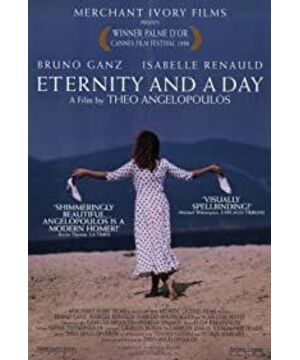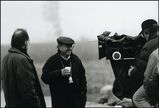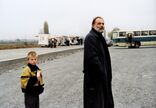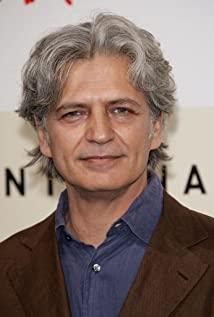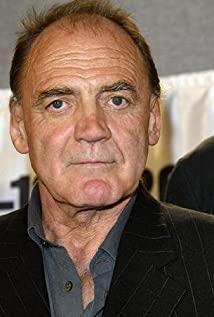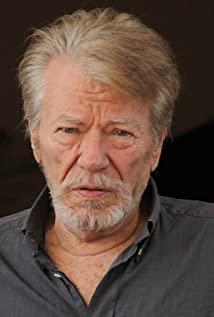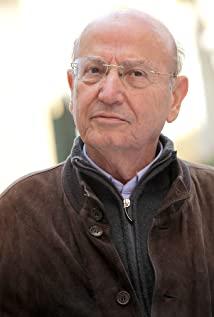The first time I heard about this movie was from a certain radio show. When the anchor recommended it to the audience, it was already a boring movie. There were no ups and downs in the whole story. As a European master movie, it is definitely worth it. Look at it many times, and taste the expression in the lens bit by bit.
The director of the film, Theo Angelopoulos from Greece, is often praised by fans for his "poetic long shots", but such a label actually obscures the brilliance of Angelo's film itself. It is a means to express the content of the film, not the purpose. Just as we praise many film shots with rich language, clever plot settings, compact structure, etc., these mere formal and industrialized praise words are enough to prove that a film’s quality. Excellent, but it is difficult to support the word "great" by these alone.
The core part of the theme to be explored in this work is time, and elements such as life, hometown, and emotion provide us with various perspectives to gain insight into time. Next, I try to share this with limited understanding. The feeling of time in this film.
Before seeing "Eternity and One Day", I happened to come into contact with Han Yu's "Sacrificial Twelve Langwen" and Kurosawa's "Desire of Life", a classical Chinese essay, a Japanese film and a European Movies, three seemingly unrelated works of literature and art, have something in common in them.
In "Sacrifice of the Twelve Lang", Han Yu wrote very clearly about the time of gathering and dispersing between himself and the Twelve Lang, thinking that he would take care of the Twelve Lang after he settled down. Saying, "The sky is the sky, it is extremely powerful! From now on, I have no intention of being in the world!" This kind of grief will also accompany Han Yu for the rest of his life. The perspective provided here is to feel the death of others. In the context of Confucian culture with a strong family concept, the death of Twelve Lang left the Han family with only Han Yu, who could manage the family, and his children were still young. It is white, and the shaken may fall off. The blood is getting weaker and the ambition is getting weaker, and the geometry will not die from you." Besides the death of a relative, the greater grief may come from the unsustainable family. Worry is a sense of hopelessness about the future.
Let's talk about "The Desire of Life", the protagonist Kanji Watanabe played by Shimura Joe (although the actor's name is very playful, but he played it so well, it is worth remembering the name) The protagonist Kanji Watanabe is a civil servant who lives in The position of the head of the section is never shown in the film. There is only a repeated work segment such as stamping, office work, and processing documents. It can be seen that the content of his work for decades has basically remained unchanged. (such as the government, large companies and other organizations), the division of labor system for the purpose of pursuing efficiency is formed here. The alienation of people is clearly visible here. The content of the work is not directly responsible for the service objects, and there is no direct contact with people during the work process. Think about how many such jobs exist in contemporary society, Foxconn employees, courier delivery guys, government civil servants, office white-collar workers, etc. Chaplin made a pungent satire on this as early as 1936's "Modern Times" . This environment prompted Watanabe, who was diagnosed with cancer, to conduct a profound reflection. After getting rid of the initial fear of imminent death, he was determined to persuade various departments of laziness to overcome many obstacles and build a park for the citizens to remove the ditches. The turning point is the young female staff member who represents the fresh life and youth in the film. When he first learned that he was suffering from cancer, Watanabe planned to spend years of his savings, such as going to drink expensive alcohol, asking a writer he met by chance in a pub to teach him to spend money, and then indulging in bars, dance halls and other places. The rebellion of the ordinary life of the past few decades is Watanabe's proof that he is alive, just like facing a pile of "must do/must go xx" and other lists to complete one by one, it does not seem to be. There are regrets in doing so. It seems that you can leave with peace of mind. In fact, you are escaping the anxiety of death. When the ballroom pianist asked him for a song, Watanabe chose a love song from the 1920s,
"How short life is,
Girls, let's fall in love,
Before the red lips fade,
Before the enthusiasm becomes cold,
No one knows what will happen tomorrow.
how short life is,
Girls, let's fall in love,
Before the black hair fades,
Before the flame of love goes out,
Today is gone forever. "
When he sang this song in tears alone, the atmosphere in the bar was also deserted. At this time, Watanabe probably understood that his actions were not as real as the newly bought hat on his head.
The next day, a young female clerk came to Watanabe to go through the resignation procedures, and the follow-up purchases of stockings, dating, etc., can easily make people feel that Watanabe seems to have secret feelings, and even Watanabe himself, but it is not the case. The last time the working female staff member met, and in her revealing confession, we have also understood that Watanabe's behavior is not lust for beauty, but a kind of nostalgia and longing for life. Later, Watanabe mediated between various departments for the citizens, and the construction of the park was the real product of this nostalgia. In the night after the event was completed, Watanabe sang "Life is so short" on the swing alone. At this time, his state of mind Very different from the last time.
The perspective provided here is the death of the protagonist himself. Of course, there is no scene of Watanabe's death in the movie, but for Watanabe himself, the end of life is not death, but the kind of alienation and repetition. At work, he gradually lost his sense of life, which is when Watanabe asked himself what he could do at the city hall, but he said it was too late when he wanted to do it.
Finally, in "Eternity and a Day", our protagonist Alexander, an elderly poet who is diagnosed with cancer and is about to be hospitalized for treatment, chooses to find the answer to the question of how long tomorrow will last on his last day before his admission. Like "Desire to Live", the end of life expressed by director An Zhe is not death, but Alexander's hospitalization, which is the moment when he loses his freedom.
Most of the film's performance of time is non-linear. As audiences, we must temporarily abandon the inherent concept of linearity and continuity of time to watch this film. The protagonist's wife, Anna, has passed away, but many scenes in the film are composed of the old protagonist and his young wife. Throughout the text, there are scattered letters and monologues left by the wife to Alexander. Here we can understand that in people In the general cognition, it seems natural that the concept of time should come first, but the director disrupted this order, and let the old Alexander and the wife and mother in the memory be in the same scene and communicate, that is, the one who really connects his own time is Our experiences and emotions. Think about it, when we recall, we seldom talk about the year and month of AD, how I was, but use a general concept, such as childhood, thinking of the year, etc., what restricts our understanding of time is our limited language, This is more concretely expressed in the science fiction novel Arrival.
There is a love story in this film that I thought was very touching. Anna said in a letter to Alexander, "I want to kidnap you between two books", but the second half of the sentence is a bit sad, "You live in me and My daughter is beside me, but my heart is elsewhere.” Where is Alexander’s heart? It is the continuation of writing a long poem, and it may be the answer to that question, as well as his attachment to his hometown. The hometown is also reflected in the film, either explicitly or implicitly. For example, the Albanian child finally boarded the boat to return home. At the family gathering, Alexander, despite Anna's objection, insisted on going to the hills beside the beach to find his young boy. The stone carvings left at the time, and the two poets' dedication to their mother tongue. Only when they speak their mother tongue, do they feel that they have really returned home, and Alexander's face was lost when he learned that his daughter sold the ancestral house. Both express the importance of hometown. Hometown is the beginning of our life and the first sign of self-time. When the protagonist seeks a new expression of self-time, hometown has naturally become a rare constant. The film begins with Alexander going to his hometown to play by the sea when he was young. , ended with the old Alexander facing the same beach aphasia, the intention of the hometown to undertake this life from beginning to end. When I saw the hometown intention of the film, I also understood my father's obsession with his hometown. No matter how I laughed at that place's backwardness, poverty, conservative ideas, etc., he didn't even argue with me. It's impossible for me to change the hometown in his heart, and I can't listen to him no matter how much I talk about it. I remember the first time I went to his hometown when I was young. It was still snowing heavily at that time, and my grandfather stood by the big ditch in front of the door, waiting for his son who left home at the age of nineteen and returned when he was thirty. I watched him run to Grandpa, as if he had forgotten that he was the husband of a woman and the father of a child, as if he was still a child, just ran out to play and just came back.
Another important emotion in the film is the encounter between the protagonist and the Albanian child. After the protagonist rescued the child from the human traffickers, he insisted on sending the child back to China, and constantly stressed to the child that he was about to travel (that is, to find the answer, to continue writing. That poem), after several twists and turns, it was finally time to part. After the child experienced the death of his companion, returning to China seemed to be the only option. The calm and dull tone of the whole film has also changed here.
"You're leaving too, I'll be lonely."
"You will embark on a journey, through ports, around the world..."
"goodbye..."
"Stay with me! . . . Your boat doesn't leave in two hours, and I only have tonight. Stay with me..."
"I am really scared."
"Me too... stay with me... stay..."
Then the two embraced,
"Would you like to take that one?" Alexander pointed to the bus. The two chose to spend the last time together in this way. The protagonist opened the window for the child, and the two looked out the window happily. A moving smile. In this entire bus scene, the two did not exchange a word of language. Yes, language is weak and meaningless at this moment. Then Alexander met the Greek poet and asked him "how long will tomorrow last", but the poet left without answering...
A child, the protagonist, a leftist youth, and a conductor appeared in one shot of the bus section. Personally, I guess some directors have metaphors for their own life. Exploring and thinking about eternity in the prime of life, and finally in old age.
Alexander was obsessed with the journey that never started, and the experience with the child replaced the protagonist's obsession. After parting with the child, Alexander sat alone in the car until dawn, and then formed a strong contrast with the long shot of the film. The rapid disappearance of Alexander from the camera indicates that Alexander accepts this "special journey" and chooses to accelerate to embrace the end of his life
What Alexander was obsessed with was to continue writing the long poems of a nineteenth-century Greek poet, who had lived in France for a long time. After returning to Greece, he planned to write poems in his native language, but he did not know Greek, so he wrote to his compatriots. They buy entries. In the experience of the protagonist and the Albanian child (the second protagonist of the film), he also bought entries from the child several times. This child from Albania, which is under the dictatorship, and his refugee friends Cars make a living, and are often caught by traffickers and sold to wealthy people. The accidental death of his companion has deepened the child's tragedy. In the final farewell to the child, the two were reluctant to part, the last entry the child said was "too late", but the child who symbolized hope said such a heavy word, the meaning behind it is self-evident , but then the protagonist took out a coin, and here we can't help but think of Russell's phrase "The real hero is the one who can bravely face the tragedy of life after realizing it." I have read this sentence for the first time, even in a high school composition, but I am afraid that it will take many years to really think about and understand this sentence.
The suffering of the child here suggests a certain tragedy of the inevitability of life, and the behavior of old Alexander represents the inevitable search for the answer to the question of what eternity is or how long it will last, and by imitating it. The way that predecessors went to buy entries in order to pursue a new expression, this feeling is like I want to explain to you who see here what the problem that Alexander is pursuing is, but I don’t know how to express it clearly. The reference is "how long will it last tomorrow", but the question is not just a simple sentence, these efforts just bring us closer to the essence of the question.
"Sacrificing the Twelve Langwen" expresses the grief of the disappearance of life, "Desire for Life" takes a step forward, outlines the beauty of the future for us, and wins the name behind us, "Eternity and One Day" continues to ask us questions, How long will it last tomorrow?
Why must this be the problem? I can't explain in a few words why this has to be done, but Faust seems to be able, considering his bet with Mephisto, whether it's the desires of Gretchen's flesh (material desires), Or the desire for Helen's beauty (art, beauty, happiness), and finally the greed for power and vanity, which failed to satisfy Faust, only in the last moment of his dying and blindness, for a better future. His longing made him say "stop, what a beautiful moment".
This is a question that life cannot avoid after a long period of time. The expression of this question in "Eternity and a Day" is "how long will tomorrow last", and it is very difficult for me to only try to express this question, Not to mention the answer, but the movie still gives us an answer, "one more day than eternity."
View more about Eternity and a Day reviews


